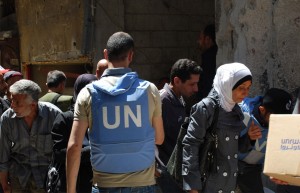
UN – Even as the death toll from Syria’s three-year civil war continues to rise, the country’s human development has also suffered immense collateral damage – the economy has been gutted, the healthcare system is in ruins, and education facilities are “teetering” – according to a new joint United Nations report out today.
According to the report, “Squandering Humanity,” covering the last two quarters of last year, three out of four Syrians now live in poverty, with more than half the population – 54.3 per cent in 2013 – living in extreme poverty. As the conflict grinds on with no end in sight, some 20 per cent of the population now barely has the means to meet basic needs.
“Syria is now blighted by joblessness and overwhelmed by unemployment,” said Alex Pollock, Director of Micro-Finance for the UN Relief and Works Agency for Palestine Refugees in the Near East (UNRWA), which worked with the UN Development Programme (UNDP) and the Syrian Centre for Policy Research to compile the report.
“Since the conflict began, 11 million dependents have lost their primary means of financial support as 2.67 million people joined the unemployed,” Mr. Pollack continued, adding that, runaway inflation is squeezing the households of an increasingly jobless, poor and desperate population.
The report also notes that public debt continued to grow in the second half of 2013, as the Government imported oil and basic commodities to alleviate shortages in the local market and to subsidise basic goods. By the end of the reporting period, public debt reached 126 per cent of GDP, but, while still largely drawn from domestic debt, a mounting portion is composed of foreign borrowing, mainly from Iran.
“The figures are staggering,” said Rabie Nasser, researcher at the Syria Centre for Policy Research in Damascus. “By the end of 2013, total economic loss since the start of the conflict is estimated at $143.8 billion. The implications for a human development organization like UNRWA are tragic and immense.”
Among its other key findings, the report notes that Syrian human development regressed by more than four decades during the conflict; since 2011, the country has fallen from the “medium” cluster of nations to the “low human development” group, largely as a result of weakening performance in education, health and income, measured by the Human Development Index.
Education is teetering with a more than half of all school-age children (51.8 per cent) no longer attending school. This reached above 90 per cent in Al-Raqqa and Aleppo and 68 per cent in Rural Damascus. By the end of 2013, 4,000 schools were out of service because they were destroyed, damaged or housing internally displaced persons (IDPs).
The healthcare system has been compromised through damage and destruction to medical facilities and healthcare infrastructure, the flight of healthcare professionals, death and injury of medical staff, and the collapse of the pharmaceutical industry. Some 61 of 91 public hospitals were damaged with almost half (45 per cent) out of service, while 53 private hospitals were also affected.
“The social impact and the toll on individuals is incalculable,” said Chris Gunness, UNRWA Spokesperson. “As the report points out, the conflict is squandering humanity through violence, fear and destruction that has inflicted multi-dimensional socio-economic harm across all aspects of people’s lives, livelihoods and habitat, from which few Syrian households have escaped unscathed.”






